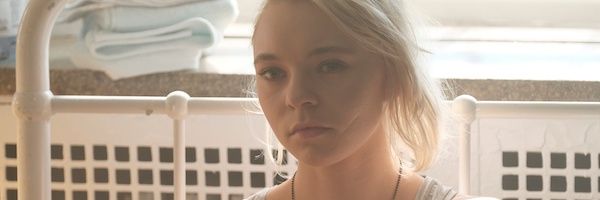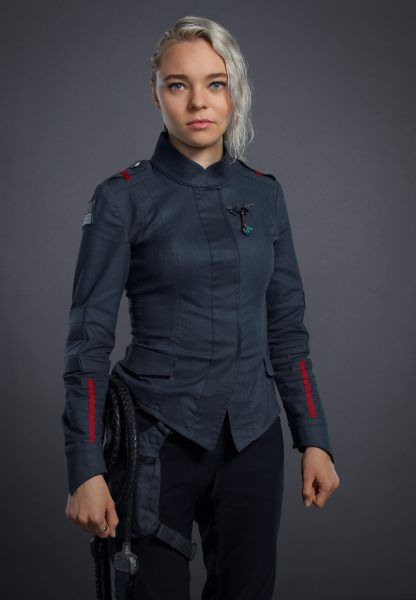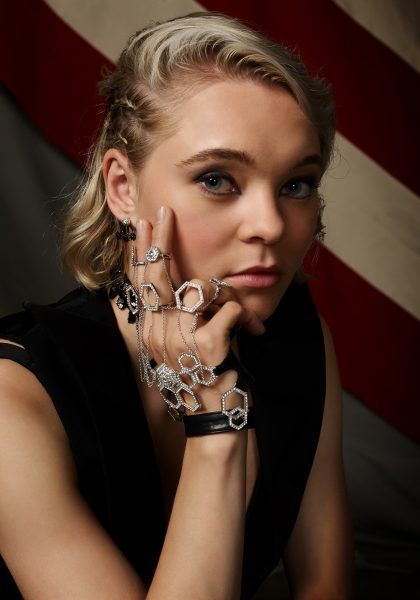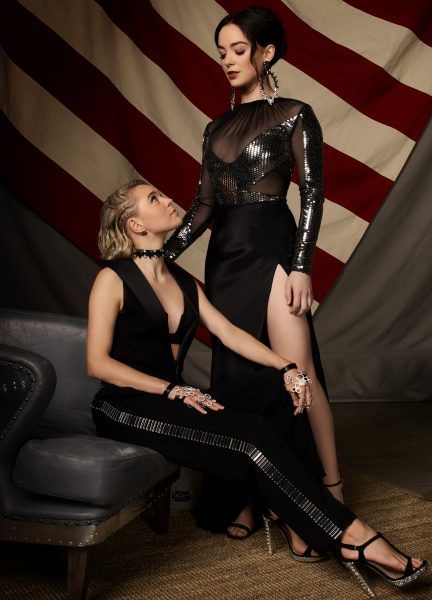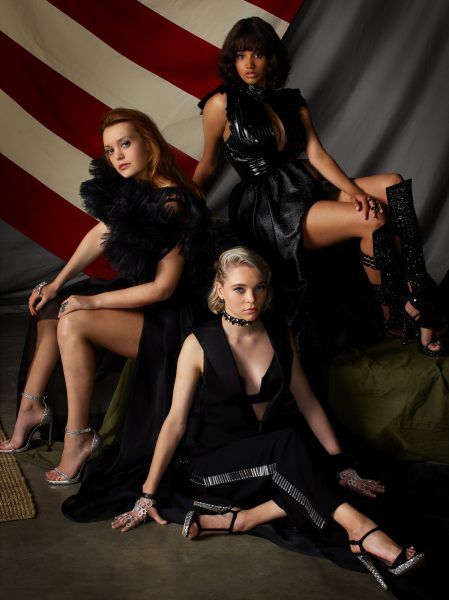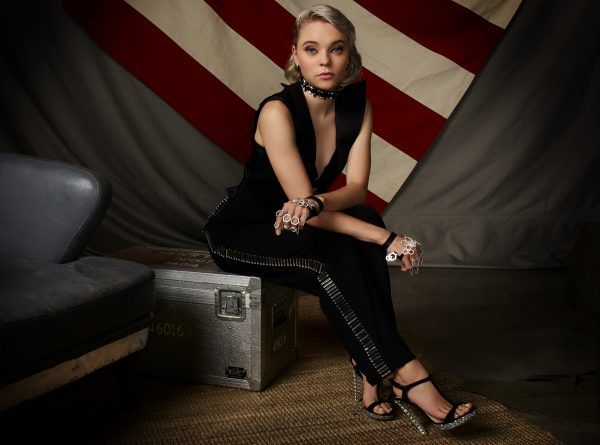Created by Eliot Laurence (who also created Claws), the Freeform drama series Motherland: Form Salem is set in an alternate present-day America that sees witches fighting for their country, after a deal was agreed upon with the U.S. government during their persecution 300 years ago. It’s a strong matriarchal society in which women are on the front lines, and where three young women – Abigail Bellweather (Ashley Nicole Williams), Tally Craven (Jessica Sutton) and Raelle Collar (Taylor Hickson) – find themselves as a unit in basic training for combat magic, at a time when dangerous terrorists are threatening the world and forcing them to be ready for early deployment.
During this 1-on-1 phone interview with Collider, actress Taylor Hickson talked about juggling shooting Motherland with the sadly now cancelled Syfy series Deadly Class, why the story of Motherland was so appealing to her, how much her character evolved, what shifting the power dynamic allowed them to do with the storytelling, having co-stars Ashley Nicole Williams and Jessica Sutton to go on this journey with, the threat of the Spree, getting to explore some witch mythology and customs on the show, and whether she’d gotten any hints about a possible Season 2.
Collider: It seems like you must have gone straight from Deadly Class to Motherland: Fort Salem, but timing isn’t always exactly what it seems. How soon after Deadly Class ended, did Motherland start?
TAYLOR HICKSON: So, they actually overlapped. We were trying to navigate how, in one year, it was going to be possible to fit in the filming of both seasons of both shows, were Deadly Class to go for a Season 2. I actually did the pilot of Deadly Class first, and then, the following year, I did the pilot of Motherland and Season 1 of Deadly Class. I was working on both in the same year and they were not too far apart, in the booking of both series. They were hand in hand, at one point, and we were trying to divide my time between the two. We ended up working it out and I was able to do both, but unfortunately Deadly Class didn’t go, which was probably better for my schedule, but it was hard on my heart.
Did it ever get really confusing, going back and forth, playing the two different characters, or did it help that the projects were both so different?
HICKSON: I was able to shoot Deadly Class, just prior to shooting the pilot for Motherland, so I did have some separation and I was able to gather my thoughts before walking into a completely different headspace, but it is confusing. When you’re playing one style of a person for six plus months, it’s difficult to jump back into even just auditioning and trying to play a completely different person there. That was very tricky.
When this project came your way, how much were you told about it? The show creator had been thinking about this and developing it for a long time, but how much did he tell you about what it would be?
HICKSON: The pitch to us actors was ethereal. The first thing that seduced me was that initial gender role reversal that is so transparently prominent in the world of Motherland. Being a female in film and just really having to work our hardest to be something other than a secondary character, like the wife or the sister or the girlfriend, these women are driving the story and driving the narrative. That’s something that was so special to each person that landed this opportunity, and we wanted to really get this right.
Did you also know a lot about your character, in the beginning, or have you learned things, as you’ve gone?
HICKSON: We really had to chip away at her. When I first read the script, with her physical actions, it talked about her walking along the train tracks and being very much absorbed in being melancholy and grieving over the loss of her mother, which was so recent, and feeling bad for herself, for having to follow in her mother’s footsteps because she felt like she was condemned to the same fate. Upon exploring that, we decided it was a much stronger choice to make her angry, and to make her challenge authority and push back, instead of feeling sorry for herself. We thought she would be a much stronger heroine and a great example for the women fighting for their cause, if he came from a place of rage, which is a very traditionally masculine emotion. In our world versus the world of Motherland, there’s that repression of emotions, toxic masculinity, and just trying to remain stoic through times of pain. So, we wanted to display that toxicity to our viewers and hopefully open their eyes to some of the unhealthy social constructs.
I love that not only do you have this matriarchal power dynamic, but we get to follow the female recruits, and there are female military leaders, female soldiers, and even a female president. And with this matriarchy, a young woman’s sexuality is something that gives her power and strength, and is not something to be ashamed of. Was that something that you also really appreciated and that you’re excited about viewers getting to see?
HICKSON: Yeah. Sex is so demonized for women, being slut-shamed growing up, or just general name-calling, whereas men are praised for going to bed with a woman. They feel empowered, where we feel less of ourselves because of those decisions that we make. But in Motherland, sex is celebrated. It’s not only physically empowering, but it also emotionally empowers them. You see improvements in their work. I just thought that was such an incredible thing that they decided to have in Motherland. It’s a really fun thing, to open the eyes of viewers and ourselves with, and can help us better understand our community and our effect on social media, and really try to put the men in our shoes.
I also love the main romance that’s explored this season is with your character, in a LGBTQ relationship, but that that’s not, at all, where the drama comes from, as there are plenty of other things that cause drama in their relationship than the fact that they’re both women. Was that also something that was fun to explore and to get to really dig into?
HICKSON: Yeah. A really prominent aim in Motherland is that, as long as you continue pointing out differences, there will always be differences. We don’t pay much mind to the diversity, after our first initial obstacle. There really aren’t comments about someone being black or Asian, and there’s no ageism, and no comments on the relationships that we choose. I have really, really great friends within the LGBT community, so it’s very, very close to my heart, and I wanted to ensure that Raelle was formed with utmost conviction and respect. We really wanted her to embody the idea that love is not divided by gender or sexual orientation. So, much of the drama does not come from things that are unspoken, but rather the motivation of the characters, which is a much more engaging idea to pay attention to. Who cares about who I love?
The unit of witches that gets put together is important because these witches are going through training and they need to be able to rely on each other. At the same time, as actors, you guys have each other to rely on, especially since I would imagine that a shoot like this is fairly grueling and exhausting. How has it been to have the experience of going on this journey with Ashley Nicole Williams and Jessica Sutton?
HICKSON: Grueling is a great word. But finding that sense of unity and sisterhood, that I’ve never found, at any point in my life, until the making of Motherland, and having a sense of unity with those women, is something I’d like to see, out in the real world. I’m a big advocate for breaking that woman versus woman stigma, and I’ve chatted with the girls a bunch about our platform, and what it means and what we want to represent. We all agreed that, being a woman is competitive. It’s hard to be happy for other women because we always have to fight so hard to have the same opportunities as a man, so we end up tearing each other down, instead of praising someone for representing what it means to be a woman. We get jealous. It’s been that way since the dawn of time. Our culture is changing now, and we really want to convey that we need to support and carry each other. It’s crucial. You won’t get farther by tearing other people down. Me and the girls learned a lot about ourselves and the world, through this series. I’m very grateful.
When you have powerful characters like this, who are powerful by themselves, but are even more powerful together, the challenge is trying to find a threat that scary enough to go up against such powerful characters. The Spree is really interesting because they’re dangerous, they’re scary, they’re mysterious, and you don’t really understand what their mission is. What can you say to tease that, over the season, and how that’s going to continue to be a threat, for all of these characters?
HICKSON: The Spree is another play on women being pitted against each other. It’s about coming after your own kind. When you’re talking about our military, the way it is on this show, hundreds of years ago, during the witch trials, our now general made a proposal to the government that was, “Stop killing our people, and we will fight your wars for you.” That idea caught on globally. Witches were protecting their own freedom, but it threatened the well-being of citizens who didn’t understand them and weren’t like them and demonized them because they didn’t understand the culture, so the Spree was born. It ends up being a witch versus witch battle. The witches in the Army have to protect the lives of the citizens, so it becomes people of the same kind and the same blood being pitted against each other.
Another cool aspect of the series is that we do get to see some of the witch customs, with the Beltane Celebration and a witch wedding. Is it fun to get to explore that side of things, to get a little bit of levity on the show?
HICKSON: Yeah. Jess, who plays Tally, and I were very much performing wiccan practices, prior to being presented with the scripts for Motherland. We were always very much into crystals and astrology, tarot, divinity light, and just general well-being and spirituality, and being very present with yourself. These are all themes in true wiccan culture. I think that’s something that’s so beautiful, that Motherland is doing. We’re trying to break that stigma of the hooked nose witch, in every Halloween special, or that there’s sparkles shooting out of your fingertips. We wanted to create something that felt a lot more authentic and believable. It’s much more incantations and chanting and vocalization. Although far-fetched, I feel like it’s a much more grounded approach and is much more true to true wiccan culture, rather than the demonization of the whole thing. We feel that this community is extremely misunderstood, so we wanted to show what the symbols truly mean and what it means to be wicca. It’s something we’re extremely proud of, going forward in this season.
Because this show has been in development and in the creator’s head for awhile, and it seems like he has a wealth of information about this world that he’s building, have there been any conversations about where things go, in the future? Do you know where your character could go, down the road? Have there been Season 2 conversations, or are you anxiously awaiting that, yourself?
HICKSON: He’s given us little hints to get us excited and give us direction, going forward, while we were shooting, to create an objective. But reading the scripts, we were just as surprised as I think the audience will be. I remember being like, “No way! He didn’t tell us this!” Don’t trust your assumptions. That’s about as much as I can give you. We’ve been chatting about a hopeful Season 2, so we’ll just have to see what the viewers think. If they want it enough, hopefully we can make it for them.
Motherland: Fort Salem airs on Wednesday nights on Freeform.

